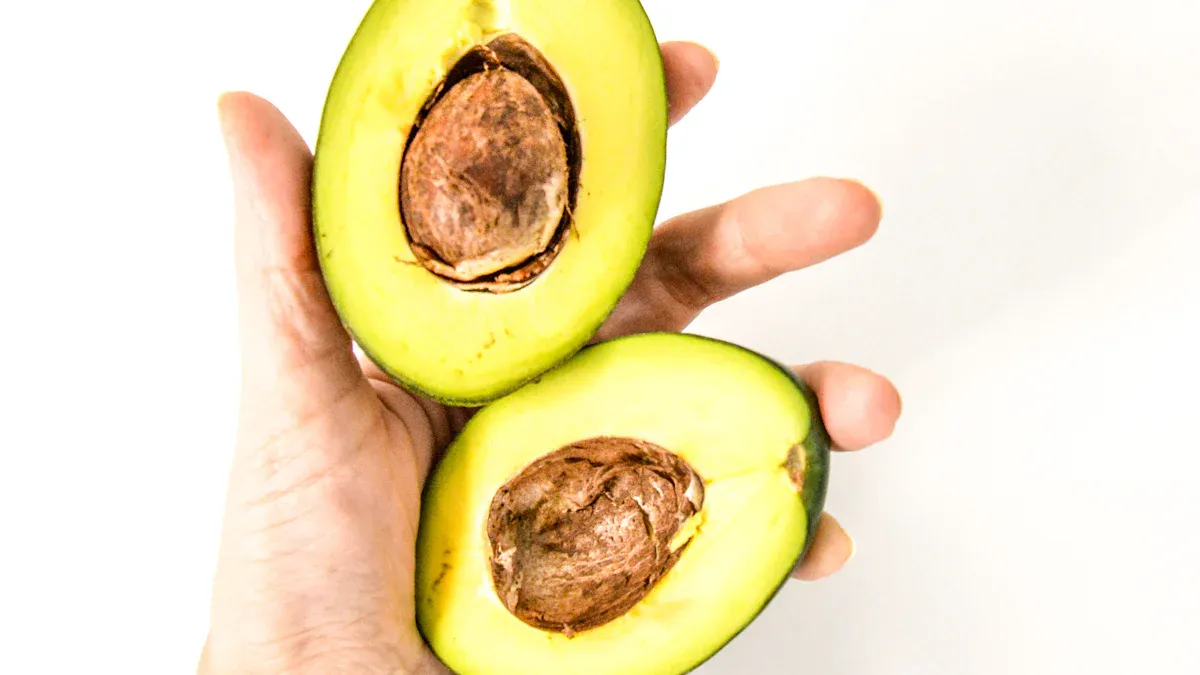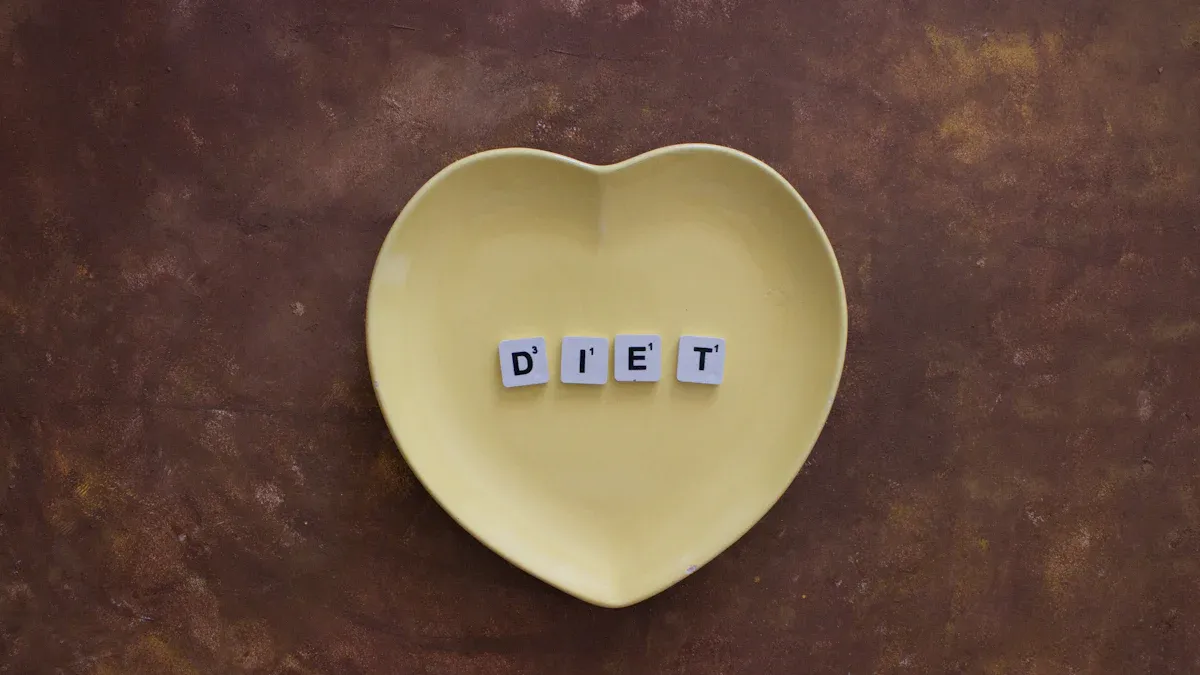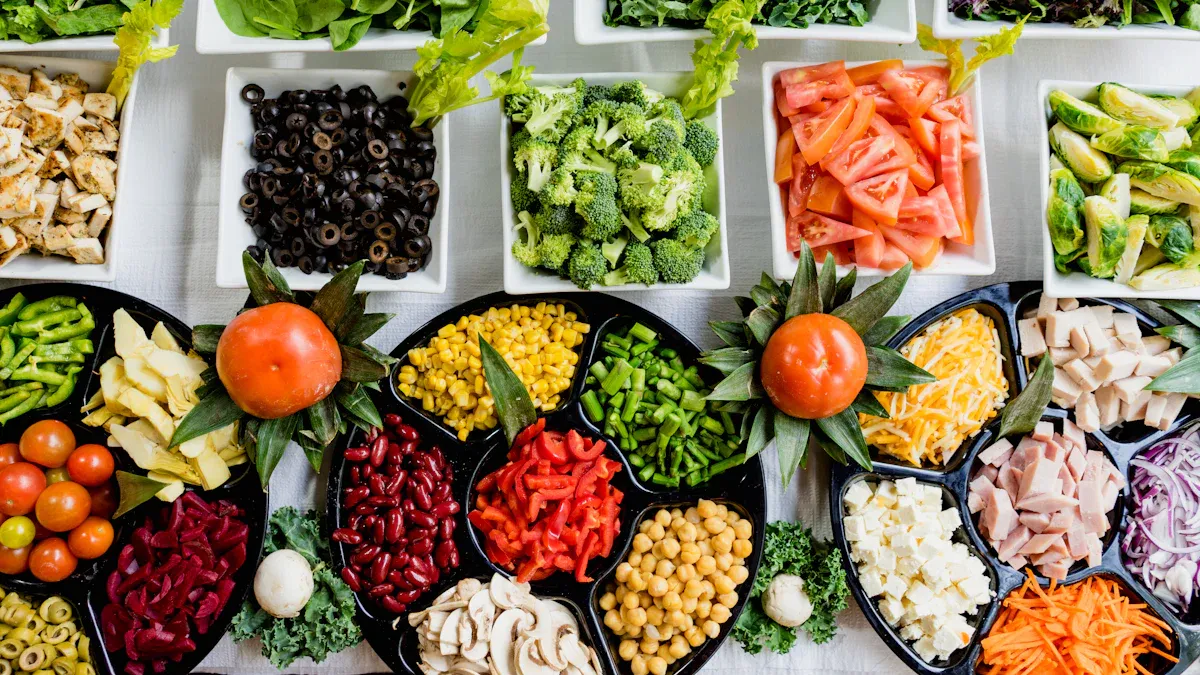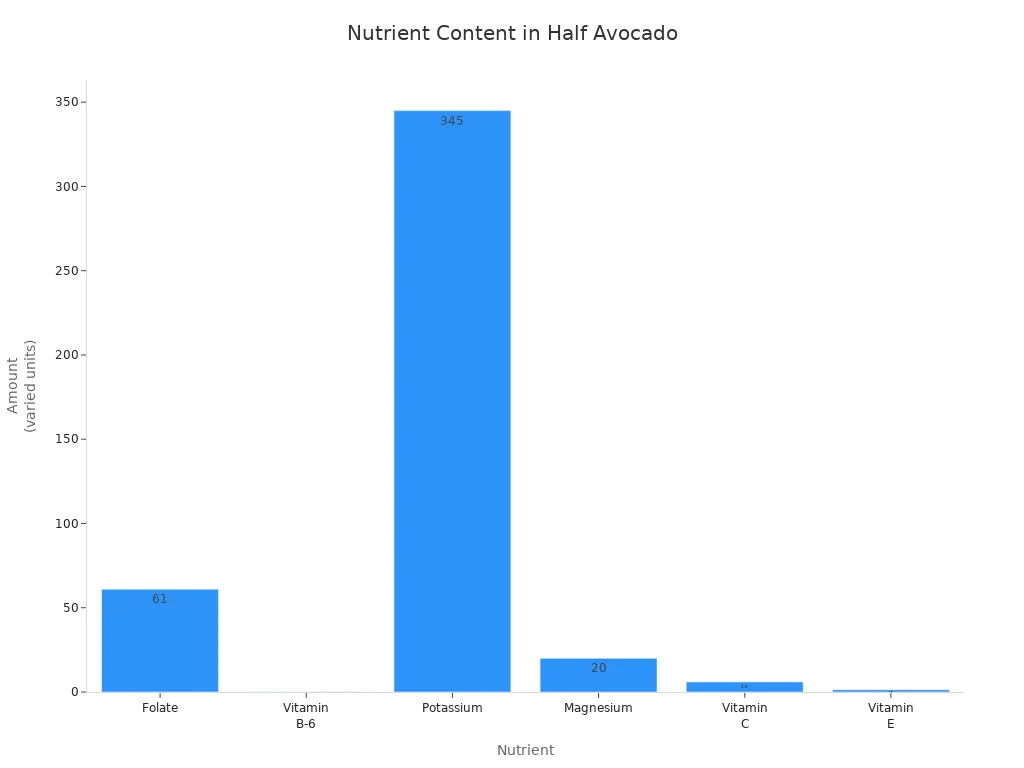
You want to unclog arteries naturally and support heart health, right? Try adding these foods to your meals: avocado, fatty fish, olive oil, nuts, berries, leafy greens, garlic, tomatoes, beans, oats, cruciferous veggies, and asparagus. Studies show that swapping saturated fats for unsaturated ones and eating more fiber-rich foods like oats can lower bad cholesterol and reduce plaque. Research also links cruciferous vegetables to less arterial calcification. These foods are simple to enjoy every day. Small changes make a big difference.
Key Takeaways
Incorporate heart-healthy foods like avocados, fatty fish, and nuts into your meals to support artery health.
Choose unsaturated fats, such as olive oil, over saturated fats to lower bad cholesterol and reduce plaque buildup.
Add fiber-rich foods like oats and beans to your diet to help lower cholesterol levels and improve heart health.
Include colorful fruits and vegetables, especially berries and leafy greens, to provide antioxidants that protect your arteries.
Make small dietary changes gradually, such as swapping white rice for brown rice, to create lasting heart-healthy habits.
Why Arteries Get Clogged

Causes
You might wonder what leads to clogged arteries. The main process is called atherosclerosis. This happens when the inside walls of your arteries get damaged. Your body starts with endothelial dysfunction. The cells lining your arteries lose their ability to protect you. They stop making enough nitric oxide, which helps keep your arteries flexible. When this happens, your arteries let in more lipoproteins and white blood cells. Inflammation starts, and your body sends more cells to the area. Oxidative stress adds to the damage. Reactive oxygen species attack the artery walls, making things worse. Over time, these changes cause plaques to build up. Plaques block blood flow and make your arteries stiff.
Here are some common risk factors for clogged arteries:
High cholesterol, especially LDL or “bad” cholesterol
Low HDL or “good” cholesterol
High blood pressure
Cigarette smoke
Diabetes
Obesity
Family history
Stress
Sedentary lifestyle
If you have several of these risk factors, your chance of developing clogged arteries goes up.
Diet’s Role
What you eat can affect your arteries. Diets high in saturated fats and trans fats raise your cholesterol. This makes it easier for plaques to form.
Saturated fats raise LDL cholesterol levels, which can contribute to plaque formation in arteries, increasing the risk for cardiovascular disease.
A diet high in saturated fat has been suggested to increase circulating atherogenic lipoproteins and inflammatory markers, triggering atherosclerotic development through endothelium dysfunction.
Triglyceride-rich particles with high concentrations of saturated fats enhance coronary smooth muscle cell proliferation in a dose-dependent manner, contributing to atherosclerosis and plaque stability.
On the other hand, some diets help prevent clogged arteries. The Mediterranean diet is a good example.
The Mediterranean diet is linked to improved lipid profiles and reduced inflammation.
It enhances vascular function, lowering the risk of atherosclerosis.
Key components include high intake of fruits, vegetables, whole grains, and healthy fats, which contribute to better cardiovascular health.
A Mediterranean diet can lower the risk of peripheral artery disease (PAD).
It is rich in antioxidants and low in unhealthy fats and processed foods.
This diet helps prevent damage to arteries, supporting overall vascular health.
When you choose foods that reduce inflammation and lower cholesterol, you help prevent clogged arteries. You can make a big difference by picking heart-healthy foods.
Heart-Healthy Foods to Unclog Arteries Naturally

Avocado
Avocado is one of the best foods to help unclog arteries naturally. You get a creamy texture and a mild flavor, making it easy to add to salads, toast, or smoothies. Avocados contain nutrients that support your arteries and help prevent clogged arteries.
Nutrient | Amount per 30g | Amount per Half Avocado |
|---|---|---|
Folate | 27 μg | 61 μg |
Vitamin B-6 | 0.09 mg | 0.20 mg |
Potassium | 152 mg | 345 mg |
Magnesium | 9 mg | 20 mg |
Vitamin C | 2.6 mg | 6.0 mg |
Vitamin E | 0.59 mg | 1.34 mg |

You get B-vitamins like folate and B-6, which help lower homocysteine levels. Potassium helps control blood pressure. Magnesium supports normal vascular tone. Vitamins C and E act as antioxidants and may stabilize plaque. Avocado also contains xanthophylls, which can lower oxidized LDL cholesterol and reduce vascular damage.
Clinical studies show that eating avocado can lower total cholesterol and LDL cholesterol. Some studies found higher HDL cholesterol, while others found lower HDL. You can slice avocado for sandwiches, mash it for guacamole, or blend it into smoothies.
Fatty Fish
Fatty fish like salmon, mackerel, sardines, and trout are omega-3 rich fish. These foods help unclog arteries naturally and prevent clogged arteries. Omega-3 fatty acids in fish lower triglycerides and slow plaque buildup. They also help reduce the risk of irregular heartbeats.
A study showed that people who ate about 1.5 grams of EPA/DHA had fewer foam cells in their carotid plaque.
Higher EPA in plaques meant less instability and inflammation.
Fish oil lowered levels of enzymes linked to plaque rupture.
You can grill salmon, bake mackerel, or add sardines to salads. Try eating fatty fish two times a week for heart health.
A drug made from purified EPA reduced plaque in heart arteries and lowered the risk of heart attack and stroke by 26% in high-risk people.
Olive Oil
Olive oil is a staple in Mediterranean diets and one of the top foods to unclog arteries naturally. Replacing animal fats with olive oil can lower your risk of death from heart disease by 19%. Olive oil contains unsaturated fats that protect against heart attacks and strokes.
Regular olive oil intake is linked to lower blood pressure and better vascular health. The bioactive compounds in olive oil help improve cardiovascular disease risk factors.
You can drizzle olive oil on salads, use it for cooking, or dip bread in it. Choose extra virgin olive oil for the most benefits.
Higher levels of apolipoprotein A-IV, found in olive oil, prevent blood clots and support healthy arteries.
Nuts
Nuts are crunchy foods that help unclog arteries naturally. You get healthy fats, fiber, and plant compounds that lower cholesterol and improve arterial function.
Mechanism | Description |
|---|---|
Favorable Fatty Acid Profile | Nuts improve blood lipids due to their beneficial fatty acid composition. |
Dietary Fiber | Nuts contain soluble fiber that lowers total cholesterol and LDL cholesterol. |
Phytosterols | These block cholesterol absorption in the intestines. |
Bioactive Polyphenols | Polyphenols reduce LDL oxidation and protect arteries. |
Reverse Cholesterol Transport | Nuts may boost HDL function, helping remove cholesterol from the body. |
A meta-analysis showed that eating nuts daily reduced total cholesterol by 10.9 mg/dL and LDL by 10.2 mg/dL. The PREDIMED trial found that 30 grams of mixed nuts daily lowered major cardiovascular events by 28% over five years.
You can snack on almonds, walnuts, or peanuts. Add nuts to oatmeal, yogurt, or salads for extra crunch.
Berries
Berries are colorful foods packed with antioxidants that help unclog arteries naturally. Blueberries, strawberries, blackberries, and bilberries contain polyphenols that lower cholesterol and reduce plaque.
Blueberries, blackberries, and prunes reduced plaque in animal studies.
A mix of strawberries, bilberries, chokeberries, and black currants lowered LDL cholesterol and raised HDL in humans.
Mice fed blueberry powder had 39% to 58% less atherosclerotic lesion size.
Berries are rich in anthocyanins, which limit fatty streaks in arteries. You can add berries to cereal, blend them into smoothies, or eat them as a snack.
Leafy Greens
Leafy greens like spinach, kale, and collards are heart-healthy foods that help prevent clogged arteries. These foods are high in nitrates, which lower blood pressure and support arterial health.
Dark leafy greens contain nitrates that convert to nitric oxide, a vasodilator.
Eating one cup of nitrate-rich vegetables daily can lower systolic blood pressure.
Studies show leafy greens protect against cardiovascular disease.
You can toss spinach into salads, sauté kale, or blend collards into smoothies. Try to eat leafy greens every day for the best results.
Garlic
Garlic is a flavorful food that helps unclog arteries naturally. It contains compounds like alliin and allicin, which lower cholesterol and reduce plaque.
Compound | Effect on Cholesterol and Arterial Plaque |
|---|---|
Alliin | Inhibits platelet aggregation and may reduce atherosclerosis. |
Allicin | Reduces total cholesterol and LDL cholesterol. |
Diallyl thiosulfinate | Produces stable compounds with health benefits. |
Aged garlic extract | Inhibits progression of coronary artery calcification. |
Garlic also boosts immune function and reduces triglycerides. You can add garlic to stir-fries, soups, or roasted vegetables. Try using fresh garlic for the most benefits.
Tomatoes
Tomatoes are juicy foods that help prevent clogged arteries. They contain antioxidants and compounds that reduce inflammation and improve lipid metabolism.
Tomato consumption lowers TNF-α and IL-6, which are markers of inflammation.
Tomatoes blunt the rise in inflammatory markers after high-fat meals.
Tomato juice reduces inflammatory adipokines in young women.
You can slice tomatoes for sandwiches, make tomato sauce, or blend them into soups. Eating tomatoes regularly supports arterial health.
Beans
Beans are fiber-rich foods that help unclog arteries naturally. They lower cholesterol and improve arterial function.
Eating half a cup of cooked dry beans daily lowered total cholesterol in volunteers. Pinto beans reduced cholesterol over a 12-week test phase.
Legumes improved symptoms of peripheral artery disease and high blood pressure. A diet rich in legumes led to major improvements in arterial function and cholesterol.
One serving of legumes daily decreased bad cholesterol in study participants.
You can add beans to salads, soups, or stews. Try black beans, kidney beans, or chickpeas for variety.
Oats
Oats are whole grain foods that help prevent clogged arteries. They contain beta-glucan, a fiber that lowers LDL cholesterol and reduces plaque.
Oat products lower serum LDL cholesterol, a key risk factor for heart disease.
Beta-glucan increases bile acid excretion, pulling cholesterol from the blood.
Oatmeal lowers total and LDL cholesterol without affecting HDL.
Oat polyphenols may reduce inflammation and plaque development.
You can eat oatmeal for breakfast, add oats to smoothies, or bake oat muffins. Choose whole oats for the most benefits.
Cruciferous Veggies
Cruciferous vegetables like broccoli, cauliflower, and Brussels sprouts are foods that help unclog arteries naturally. They contain sulforaphane, which lowers LDL cholesterol and blood pressure.
Benefit | Evidence |
|---|---|
Lower risk of death from heart disease | Eating more cruciferous vegetables is linked to a lower risk of death from heart disease. |
Reduction in LDL cholesterol | Sulforaphane reduces LDL by 12% after 6 weeks and 24% after 12 weeks. |
Lower blood pressure | Increased intake is associated with lower blood pressure. |
Combat atherosclerosis | Cruciferous vegetables may help fight atherosclerosis. |
Reduced systolic blood pressure | Intake resulted in reduced systolic blood pressure compared to other vegetables. |
You can steam broccoli, roast cauliflower, or stir-fry Brussels sprouts. Try to include these veggies in your meals several times a week.
Asparagus
Asparagus is a green vegetable that supports vascular health and helps prevent clogged arteries. It contains prebiotic carbohydrates that keep your gut healthy. A healthy gut supports the cells lining your blood vessels and reduces arterial stiffness.
You can grill asparagus, add it to salads, or roast it with olive oil. Asparagus is easy to prepare and adds flavor to many dishes.
Grapes
Grapes are sweet foods that help unclog arteries naturally. They contain polyphenols that improve arterial function and increase nitric oxide production.
Grape juice and red wine improve flow-mediated dilation, a sign of healthy arteries.
Red grape polyphenol extract increased FMD in patients with coronary heart disease.
Polyphenols from grapes help release nitric oxide, which keeps arteries flexible.
You can snack on grapes, add them to salads, or freeze them for a cool treat.
Moringa
Moringa is a leafy plant used in teas and powders. It contains antioxidants like quercetin, which protect cardiovascular health and help prevent clogged arteries.
Evidence Type | Findings |
|---|---|
Preclinical Studies | Moringa shows antihypertensive effects in animal studies. |
Clinical Studies | Results on blood pressure reduction in humans are limited and conflicting. |
Mechanisms | Bioactive compounds in moringa may help lower blood pressure and cholesterol. |
You can add moringa powder to smoothies or drink moringa tea. Moringa may help lower cholesterol and reduce inflammation.
Fenugreek Seeds
Fenugreek seeds are small foods that help unclog arteries naturally. They contain fiber, saponins, and antioxidants that lower cholesterol and support arterial health.
Component | Role in Lowering Cholesterol and Supporting Arterial Health |
|---|---|
Fiber | Binds to cholesterol and helps remove it from the body. |
Saponins | Block cholesterol absorption in the intestines. |
Antioxidants | Reduce inflammation and oxidative stress. |
Blood Sugar Regulation | Helps keep blood sugar stable, supporting healthy cholesterol levels. |
Improved Heart Health | May lower triglycerides and improve lipid profiles. |
You can soak fenugreek seeds overnight and add them to salads or yogurt. You can also use ground fenugreek in curries and soups.
Easy Ways to Add These Foods
Meal Ideas
You want to make your meals better for heart health, but you might not know where to start. Try mixing up your plate with colorful veggies and fruits. You can toss spinach, tomatoes, and avocado into a salad. Add grilled salmon or mackerel for a boost of omega-3s. Swap white rice for brown rice or quinoa. Beans work great in soups or chili. If you like breakfast, oatmeal with berries and nuts is a tasty way to start your day. You can use olive oil for cooking or as a salad dressing. Try adding steamed broccoli or roasted Brussels sprouts to your dinner. These simple swaps help you get more nutrients and support your heart health.
Tip: Aim for different colors and types of fruits and vegetables in your meals. This keeps things interesting and gives you a variety of nutrients.
Snacks
Snacking can be healthy and fun. You can grab a handful of almonds or walnuts when you feel hungry. Sliced tomatoes with a sprinkle of garlic make a quick snack. Try hummus made from chickpeas with carrot sticks. Frozen grapes are sweet and refreshing. If you want something crunchy, roasted asparagus or kale chips are easy to make. You can blend berries into a smoothie or eat them plain. These snacks help you stay full and keep your heart health on track.
Shopping Tips
Shopping smart makes it easier to eat for heart health. Make a list before you go to the store. Look for whole grains like oats and brown rice. Pick up fresh or frozen berries, leafy greens, and cruciferous veggies. Choose fatty fish from the seafood section. Buy nuts in bulk to save money. You can find beans canned or dried. Grab olive oil and avocados for healthy fats. Try to avoid processed foods with lots of salt or sugar. Involve your family in shopping and meal prep. Cooking together can be fun and helps everyone learn about heart health.
Note: Prepare ready-to-eat foods for busy days. Cook in bulk once or twice a week to save time and make healthy choices easier.
Adding heart-healthy foods to your meals can help keep your arteries clear and support your heart. Long-term studies show that eating more fruits, vegetables, whole grains, and healthy fats lowers blood pressure and helps prevent heart disease. You do not need to change everything at once. Small steps work best.
Evidence Type | Description |
|---|---|
Dietary Interventions | Gradual dietary changes are more feasible for long-term adherence compared to dramatic short-term restrictions. |
Implementation Research | Identifies barriers to long-term dietary modifications and emphasizes the need for sustainable strategies. |
Start with a few new foods each week. Over time, these habits make a big difference for your heart.
FAQ
What foods should you avoid to keep your arteries clear?
You want to skip foods high in saturated fat, trans fat, and added sugar. These include fried foods, processed snacks, fatty meats, and sugary drinks. They can raise your cholesterol and make plaque build up faster.
What is the best fruit for unclogging arteries?
Berries work great for your arteries. Blueberries, strawberries, and blackberries have antioxidants that help lower cholesterol and reduce plaque. You can eat them fresh, frozen, or blended into smoothies.
What is the easiest way to add heart-healthy foods to your meals?
Start small. Add avocado to toast, toss spinach in salads, or snack on nuts. Swap white bread for whole grain. Use olive oil instead of butter. These simple changes make a big difference over time.
What signs show you might have clogged arteries?
You may feel chest pain, shortness of breath, or tiredness. Sometimes, you notice nothing until a problem happens. If you worry about your heart, talk to your doctor for a checkup.
What drinks help keep arteries healthy?
Water is always a good choice. You can also try green tea, tomato juice, or grape juice. These drinks have antioxidants that support your arteries. Avoid sugary sodas and energy drinks.
